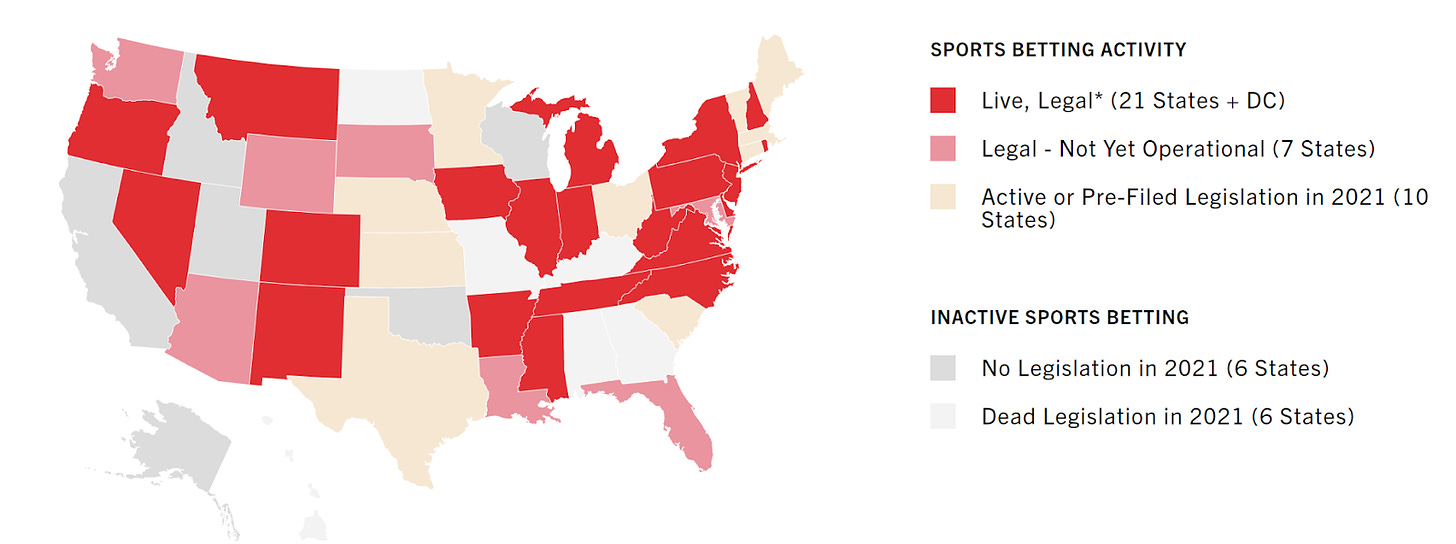Penn National Gaming (Ticker: PENN) - Brief Breakdown
In our Brief Breakdowns, we pick a stock and take opposite sides – one of us presents the bullish argument and the other presents the bearish argument.
Company Description
Penn National Gaming (NASDAQ Ticker: PENN) is an American company that operates 43 facilities including casinos and racetracks throughout the United States and Canada. Many of the facilities Penn operates are under the Hollywood Casino brand, but they’ve also created a spin-off company called Gaming and Leisure Properties in November 2013 as a real-estate investment trust (REIT) specializing in casino properties.
Quantitative Analysis
At the time of this writing (5/23/2021), Penn is trading at $77.57, with a 52 week range of $26.96 - 142.00 and a market cap of $12.13B. In Q1 of 2021, Penn generated revenues of over $1.2 million, which is a 6% decline compared to Q1 of 2019. There are mixed feelings about this earnings report, as Penn reported a $608.6 million loss in Q1 of 2020, due largely to the combination of a substantial investment in Barstool Sports and the outbreak of the COVID-19 pandemic. Penn also reported a $0.55 earnings per share which is greater than the $0.35 earnings per share reported from Q1 of 2019. Overall the Penn stock has shot to the moon over the past year and is up more than 163% despite the recent dip and the mixed Q1 report. Penn is now closing the gap on other well-known internet-based gambling companies such as DraftKings and FanDuel, and is expected to be a major player in the industry for the foreseeable future. You can view a breakdown of PENN’s earnings from Q1 2021 here and view their 2020 annual 10k here.
Qualitative Analysis
Although COVID-19 restrictions have hurt Penn National, CEO Jay Snowden reported that, “... visitation and length of play continue to improve across all age segments of our player database. Moreover, we saw volumes in the month of March that we have not seen since 2019.” Snowden also reported that Penn plans to have the Barstool Sportsbook App available in 8 states by football season and 10 states by the end of the year. Currently, 22 states and Washington D. C. have legalized sports gambling in some form which leaves room for growth as the legalization occurs throughout the rest of the 50 states. According to Cision, the sports gambling industry has a projected compound annual growth rate of 10.8%, which will provide Penn the ability to grow and acquire new customers where sports gambling was not previously accessible.
Bullish Thesis
Here are three points to support the bullish thesis:
Acquisition of Barstool Sports: In early 2020 PENN purchased a 36% stake in Barstool Sports, a massive (and still growing) digital media company. According to Barstool’s “Partners” page, they reach over 100M unique monthly users, have over 132M followers across their 1,545 social media accounts, and get 1.3B monthly video views. Dave Portnoy (founder of Barstool) alone has 2.5M followers on Twitter, where he regularly promotes Penn. All of this is to say that through Barstool, Penn has access to a massive audience, and both companies are making use of this strategic partnership. In September of 2020, the Barstool Sportsbook was launched in Pennsylvania and has since expanded to Michigan, Illinois, and Indiana. Access to Stoolie Nation is a huge advantage that Penn has over industry competitors.
Broader legalization of sports betting: As noted above, the legalization of sports betting is gaining momentum in the U.S. Sports betting is currently legal and operational in 21 states + DC and has been legalized (but is not yet operational) in an additional 7 states. Although legalization is gaining momentum, legislation often advances slowly. It will be crucial for Penn to focus on drawing in new users from states where sports betting is already legal - their rapid roll out of the Barstool Sportsbook indicates that they are more than capable of doing so. Because Penn operates both in-person and online gambling platforms, it can leverage increased legalization on two fronts, whereas many competitors offer only one or the other.
Market share potential: Penn faces stiff competition, especially from already-established online sports betting platforms like DraftKings, FanDuel, and William Hill. According to Bernie McTernan, an analyst with Needham & Company: “We are bullish on the online sports betting (OSB) and iGaming TAM in the US and see the potential for PENN to take significant, profitable market share on the strength of Barstool's differentiated content-driven customer acquisition strategy.” Additionally, Penn’s strategic partnership with Barstool allows them to allocate funds away from external marketing, which has been a substantial source of spending for competing companies. While their competitors burn cash to bring in new customers, Penn can leverage Barstool’s massive audience via a number of platforms (social media, live streams, podcasts, etc.).
Bearish Thesis
Here are three points to support the bearish thesis:
Polarization of Barstool: Although the acquisition of Barstool Sports has proven to be highly successful and highly profitable for Penn National Gaming, there is an element of Barstool Sports that can worry investors. There are many detractors and people who want to see Barstool fail, so there have been multiple attacks on that part of Penn’s business. Recently, there have been releases of sex tapes of Barstool’s founder Dave Portnoy and it seems in some way, shape, or form there is a controversy surrounding Barstool. Although Barstool has been successful navigating choppy waters, the stock price tends to dip at the start of these controversies. Although controversy tends to make Barstool’s brand more well-known, it has created a number of people who want to see Barstool fail.
COVID-Related Changes in the Market: It seems like there is a light at the end of the tunnel when it comes to the COVID-19 pandemic with mask mandates loosening in many states, which is a positive when it comes to the in-person casinos. Although there is positive traction when comes to in-person gambling, the effects of the pandemic forced the sale of Tropicana Las Vegas. The benefit to in-person gambling is that it requires a potential client to choose the location based on proximity in many cases. The online casino market is a difficult one, as there are many websites and applications so it has brought Penn into another realm with extreme amounts of competition. Hopefully with the restrictions loosening, Penn will be able to bring back previous customers into the casinos Penn operates while acquiring new customers.
Competition of Sportsbook: Although there are limitations on gambling in the U. S., Penn national has recently developed an online gambling application. As mentioned above, COVID-19 restrictions hurt the in-person gambling industry of Penn but has helped encourage many to move to online platforms. Penn and the Barstool Sportsbook have some catching up to do, as their competition like DraftKings and FanDuel have had a headstart. Currently DraftKings and FanDuel are available in 44 of the 50 states for daily fantasy, which could seemingly give both an edge in getting repeat customers from daily fantasy to their own sportsbook. Although the acquisition of Barstool Sports gives Penn National Gaming a wide reach and built in marketing and a passionate fanbase.
Learn more about Penn National Gaming here. Stay up to date on Green Candle by subscribing to our newsletter and following us on Twitter and Instagram!
Disclosure: The article was written by Daniel Kuhman and Brandon Keys, and it expresses the author's own opinions. They are not receiving compensation for it. They have no business relationships with any company whose stock is mentioned in this article. The information presented in this article is for informational purposes only and in no way should be construed as financial advice or recommendation to buy or sell any stock. Brandon and Daniel are not financial advisors. We encourage all readers to do further research and do your own due diligence before making any investments.





